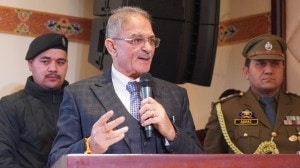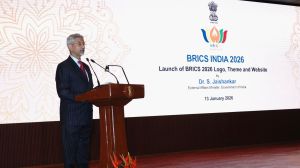Under Strobe lights
Strobe Talbott is the epitome of a policy wonk. A balding, brooding, bespectacled man of forbidding intellectual comportment, the US deputy ...

Strobe Talbott is the epitome of a policy wonk. A balding, brooding, bespectacled man of forbidding intellectual comportment, the US deputy secretary of state defines the term wonk, synonym for nerd, and a fashionable and current American argot for a someone of intense and obsessive academic pursuit.
Just how passionate is evident from the stories that surround his attainments in the field of arms control: six acclaimed and insightful tomes on disarmament, all of them written during the two decades he worked for Time magazine. While most journalists would be happy writing for the day8217;s edition or the week8217;s issue, Talbott8217;s disarmament corpus is considered among the most authoritative, exhaustive, and illuminating in the business, much of it based on personal interviews with movers and shakers in the field, of which he himself is now a central figure.
The story goes that when he was working on his book Endgame: The Inside Story of Salt II, he got up each day at 3.00 a.m. and wrote till 9.00 a.m. Then hedrove into town to earn a living as the Washington Bureau chief of Time magazine. Waking up at the crack of dawn is among the many Talbott habits that the quiet and reserved man, rated one of Washington8217;s brightest minds, mastered early.
It8217;s a family trait. Even when he isn8217;t working on a book, his rising hour is 4.30 a.m. Some running, a workout, and it8217;s to the writing desk before the rest of the world is even stirring. Invitations to dinner at his home, which can be as early as 6 p.m., come inscribed with the words Please Come Early8217; with the implication that guests should leave early too. Small wonder he graduated from journalism to the government. Most hacks are ending the day when he begins his.
For someone with a name like Strobe, he certainly shuns the limelight. But Strobe isn8217;t really his name. He8217;s Nelson Strowbridge Talbott III. Note the numerical suffix. Very evidently waspy and elite. He comes from a well-heeled investment banking Ohio family, American blueblood. Dinner conversations evenat a young age were very intellectual. Expectedly Ivy League, he schooled at Hotchkiss and Yale. At 16, he was already aware of the Cuban missile crisis, more so because the headmaster at Hotchkiss summoned everyone to the chapel to pray for the survival of the human race in the imminent nuclear war. At Yale next, he was elected to tell then Secretary of State Dean Rusk what America8217;s youth felt about the Vietnam War.
If all this has shades of a young Bill Clinton meeting John F. Kennedy; opposing Vietnam, it seems almost inevitable that the kindred spirits should meet. Having already mastered Russian his senior year thesis was a 256-page presentation on Fyodor Tyutshev, a 19th century Russian poet, Talbott went to Oxford. Among the 30 other Rhodes scholars, there was Bill Clinton from the Arkansas outback, already preparing to be the president of the United States.
The two men became housemates and hit it off on an intellectual plane, talking politics and war. Like Clinton, Talbott too escaped draft,although his medical evaluation a suspect knee was sounder. While Talbott worked on his master8217;s thesis on the revolutionary author, Vladimir Mayakovsky, Clinton often made him breakfast. Talbott8217;s interest centered on Russia, and when most students headed to the warmer climes south for their internship, he found a placement in Time8217;s Moscow bureau.
His mastery of Russian soon came in handy tapes of Nikita Khruschev8217;s unpublished recordings fell into Time8217;s lap. Talbott was chosen to handle the recordings. By the time he was 25, he had translated and edited one of the most controversial memoirs of our times. He had also launched himself into a steady and very special journalistic career.
Eastern Europe Bureau Chief, Washington correspondent covering the state department and Nixon/Ford White House, diplomatic correspondent, bureau chief in Washington, and senior editor and columnist of Time spanned a career lasting 20 years, but the underlying interest throughout was the Soviet Union. Quite simply, hewas among the most acclaimed Sovietologists in the world. His passion took him there at least 40 times. He even managed to once convince 13 members of his family to vacation in Siberia.
Through all those years, he remained in close touch with Bill Clinton. In fact, when Clinton was governor of Arkansas and visited Washington, he often stayed at Talbott8217;s home in Woodley Park, a leafy Washington suburb where he lives with his wife, Brooke Shearer, and two sons, Devon and Adrian. For that matter, Clinton still drops in occasionally, with the full presidential motorcade; and Shearer, who works at the White House, is among the First Lady8217;s confidantes.
When Clinton finally made it to the White House according to the script, it was inevitable that Talbott would get the call. From editor-at-large to ambassador-at-large was a quiet, seamless transition. He came into the state department as Warren Christopher8217;s deputy and was handed one of the biggest assignments on the plate: dealing with Russia and the newlyindependent republics in the region. But everyone knew he was Friend of Bill FOB and the buzz was it would not be long before he succeeded Christopher.
But despite his White House connection, Talbott was always circumspect, never once upstaging his secretary of state. It was said that even when he received a call from Clinton, he always made sure he reported it first to Christopher. From all accounts, Talbott has earned a reputation for subtlety and surefootedness in the Washington8217;s byzantine and often brutal bureaucracy where the pitfalls are many. For instance, when he was still a journalist, Thomas Pickering was already US ambassador to India and later Russia. Today, Pickering is an undersecretary and works below Talbott.
Talbott himself presides over a whole army of arms control types who were once his 8220;sources8221;. For that matter, his assistant secretary for South Asia, Karl Inderfurth, is a fellow journalist who was ABC correspondent in Moscow when Talbott went there often as a journalist fromTime. But people who are familiar with his work are full of praise for him. In a spotty first term that saw foreign policy glitches in Somalia, Bosnia and Haiti, the Russian front was the one that held steady despite tumultuous events. Handed the Russian brief, Talbott stuck his neck out and backed Yeltsin to the hilt, convincing Clinton too. Five years later, Yeltsin is still around and many of Talbott8217;s critics on that score are not.
He did not deal much with the Indian subcontinent, apparently scalded by his first assignment there. Sent to Islamabad in 1994 to sell a trade-off on the supply of F-16s in return for capping Pakistan8217;s nuclear programme, he returned empty-handed. The buzz was he was so frustrated with the labyrinthine and intractable proliferation problems in the region that he swore of the area. After India conducted its nuclear tests, he went again to Islamabad to persuade the Pakistanis not to test. Another failure. But last month, the President again touched him for the newassignment.
And so it came about that Strobe Talbott is handing one of the most complex assignments of his career 8212; talking India and Pakistan into signing the CTBT. There are many who expect him to write an Endgame II.
- 01
- 02
- 03
- 04
- 05































